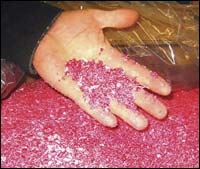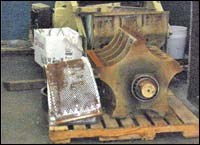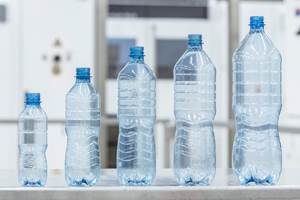Smart Handling of Regrind Can Improve Your Bottom Line
Dealing effectively with regrind has been a tough challenge for most blow molders ever since the process was invented.
Dealing effectively with regrind has been a tough challenge for most blow molders ever since the process was invented. It’s a problem most blow molders would rather not have. But a range of cost-effective techniques to re-introduce scrap material have helped blow molders boost efficiencies and improve their bottom line. The issue is most pressing these days because of the skyrocketing cost of materials and the restricted availability of some resins.
Regrind isn’t free
By the nature of the process, extrusion blow molders are saddled with regrind or off-fall, which is often referred to as reclaim. Extrusion blow molded reclaim may consist of start-up material, flash trim (moille and tails, which make up a high proportion of the extruded parison), waste parisons, purgings, and reject parts.
Some processors feel their use of regrind is “free” while other companies include an add-on to their piece price for the use of regrind. Despite wishful thinking, it goes without saying that “there is no free lunch” when it comes to the use of regrind in blow molding. The costs associated with processing of regrind are numerous, including the cost in the tooling for the pinch-offs, the additional mold cooling, the labor to handle the off-fall, the cost of the grinder and the power to run it, and the labor associated with feeding the reprocessing machine.
In the mid-1960s, leading blow molders calculated that each pound of regrind added another 5¢/lb to the cost of their material above the virgin resin price. Today, due to the increased cost of energy, labor, and machinery, the added cost for the off-fall or regrind averages about 9¢ to 12¢/lb.
Common-sense procedures
While it may sound obvious, it is critical that processors keep regrind clean and treat it with the same care as virgin resin. Many blow molders mistakenly place granulators next to their blow molding machines. There are at least three reasons why that should be avoided:
- First, grinding machinery sharply increases the noise level on the production floor.
- Second, regrind must be cool enough to be cut, chopped, or shredded. If not, the grinder will clog, knives can break, large reclaim chunks may get through the grinder to be fed back into the blow molder, and large pieces of scrap will continue to bounce around in the grinder. The tail scrap can actually increase the molding cycle time because it needs to be cool enough to feed to the grinder.
- Third, fines generated during regrinding can potentially contaminate the process and add to unsightly areas around the blow molding area.
The best way to ensure cleanliness and avoid contamination is to place all regrind in clean gaylords and move them to a separate room for grinding. Besides cleanliness, size uniformity of the granulate also counts. Keep in mind that extruder screws are generally designed to convey pellets, not irregular chips, flake, fines, or strings.
Know your machinery
There is a range of grinders/ granulators designed to handle different kinds and volumes of scrap materials. They are classified as beside-the-press or central types and further sub-categories of auger granulators and shredder/granulators, among others. The grinder must be the proper size to handle the bulk iness of the scrap. Special attention should be paid to the cutting angle of the knives and the screen used to ensure uniform particle size similar to that of virgin pellets.
How the regrind is introduced back into the mixing process also should be carefully examined. The throat of the barrel must be fed a homogeneous mixture of virgin, regrind, and colorant. This mixture should be of the same bulk density for each cycle. However, in most cases, the virgin and regrind have different bulk densities and the higher the percentage of regrind the more significant that difference is to the conveying and plasticating functions of the screw.
The screw is basically a pump, and with different bulk densities being fed to the throat of the screw, there is a greater chance for differential melt pressures and temperatures in the melt stream. Differential pressures will affect the die swell of the parison and parison sag. Differential melt temperatures may cause uneven part shrinkage, poor color dispersion, voids, and warpage.
Any use of regrind can negatively affect the extrusion of the parison. Improper sizes of regrind particles, improper blending of the regrind with virgin, and contaminants in the regrind (paper, cardboard, wood, metal) can change the parison die swell or sag and cause blow-outs, thin-outs, or hot spots. These factors can also affect the shrinkage and stress-crack resistance of the finished product. To preclude all these problems with regrind, molders should repelletize all their regrind in a separate room and convey it to the blow molding machines to be blended with virgin resin.
Remove fines, too
Any time you produce regrind, you also produce fines. These dust-like particles are even present in the virgin resin received from producers. At most blow molding facilities, fines are often found on the molding machine gates, in the extruder area, at the feed hopper, and all over the grinder.
Similarly, in a separate grinding room (if one is available), fines are often seen on the floor, in the gaylord bags, on the grinders, and of course in the regrind. This evidence of poor housekeeping is a good predictor of contamination problems.
Fines do not melt at the same temperature as the initial resin. Fines can also clog up dryers and screen packs. Fines can cause streaks, specks, and starbursts in the parison or finished product.
Fine separators mounted atop a feed hopper can remove the fines and strings to ensure the resin being fed to the screw is clean and homogeneous.
Sam Belcher is one of the industry’s leading blow molding experts. During his 48-year plastics career, Belcher has held key posts at Cincinnati Milacron, Wheaton Industries, Owens-Illinois, and Rubbermaid. Belcher was inducted into the Plastics Hall of Fame in 2003 and won SPE’s Lifetime Achievement Award in Blow Molding in 1995. He holds 56 patents and has made numerous contributions to books and trade publications. Belcher consults on plastics processing through his firm, Sabel Plastechs Inc. in Moscow, Ohio. He can be reached at (513) 553-4646 or www.sabelplastechs.com.
Related Content
Breaking News From NPE2024
Here is a firsthand report of news in injection molding, extrusion, blow molding and recycling not previously covered.
Read MoreFirst Water Bottles With Ultrathin Glass Coating
Long used for sensitive juices and carbonated soft drinks, KHS Freshsafe PET Plasmax vapor-deposited glass coating is now providing freshness and flavor protection for PET mineral water bottles.
Read MoreFor Extrusion and Injection-Blow Molders, Numerous Upgrades in Machines and Services
Uniloy is revising its machinery lines across the board and strengthening after-sales services in tooling maintenance, spare parts and tech service.
Read MoreRead Next
People 4.0 – How to Get Buy-In from Your Staff for Industry 4.0 Systems
Implementing a production monitoring system as the foundation of a ‘smart factory’ is about integrating people with new technology as much as it is about integrating machines and computers. Here are tips from a company that has gone through the process.
Read MoreLead the Conversation, Change the Conversation
Coverage of single-use plastics can be both misleading and demoralizing. Here are 10 tips for changing the perception of the plastics industry at your company and in your community.
Read MoreSee Recyclers Close the Loop on Trade Show Production Scrap at NPE2024
A collaboration between show organizer PLASTICS, recycler CPR and size reduction experts WEIMA and Conair recovered and recycled all production scrap at NPE2024.
Read More






















